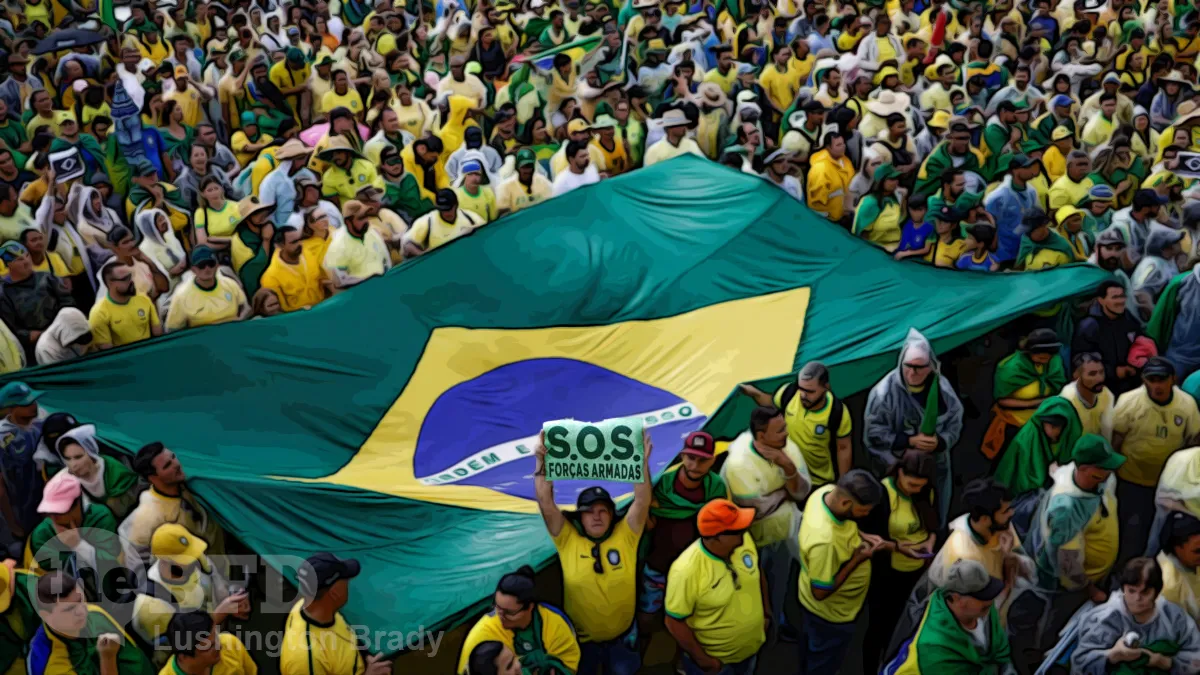Table of Contents
So, what’s going on in Brazil? If we’re to believe the legacy media, it’s a full-force assault on democracy itself by the nefarious, violent thugs of the far-right. But… that’s if we believe the legacy media, and who would?
To be fair, on the face of it, it could certainly be seen that way. Like fascists of old, have failed to win at the ballot-box, the far-right simply storm the capital and seize power by force.
Except that that’s far from the real story.
The real story is that hundreds of thousands of Brazilians (according to even the BBC) are convinced enough that the recent presidential elections were fraudulent and rigged to march in the streets of cities across the country and storm its Congress. As it happens, there are some very good reasons to suspect that they may be at least partly correct.
Firstly, the vote was as narrow a margin as can be imagined: 50.9 for socialist Lula da Silva, 49.1 for conservative Jair Bolsonaro. That alone might be thought a good enough reason to run the election again.
But the manner in which da Silva was even allowed to run is a tale of astonishing corruption.
Lula, who has served prison time for his involvement in corruption […] was responsible for the biggest series of corruption scandals in the nation’s history. Writing for the Wall Street Journal, Mary Anastasia O’Grady reminds us that:
‘The evidence against Lula was solid and his conviction had been confirmed by two appeals court. But the high court reversed its own precedents and annulled the decision. It knew that the statute of limitations didn’t leave time for a retrial. Lula was released but never exonerated.’
Even before the election, a report from the Defence Ministry to the Superior Electoral Court (TSE) warned that the nation’s electronic voting system was likely wide open to fraud.
According to the Ministry of Defence, ‘It is not possible to ensure that the computer programs that have been implemented at electronic voting machines are free from malicious insertions that alter their functioning.’
In particular, the report found that, because technicians were restricted from fully accessing the source code of the system, they were never able to properly vet its 17 million lines of programming. Access to the network during code generation “was a possible risk to security”, while testing of electronic ballot boxes were unable to rule out “the influence of any malicious code capable of altering the functioning of the voting system”.
The Ministry of Defence issued an official note on November 10, reporting that it could not “exclude the possibility of fraud or inconsistency in electronic voting machines and the electoral process of 2022”.
That warning was completely ignored by one Justice Alexandre de Moraes of the Superior Electoral Court. Moraes similarly rejected filings from Bolsonaro’s Liberal Party as “bad faith” litigation and fined the plaintiffs $4.3 million for daring to ask the court’s opinion about the election.
Who is Justice Alexandre de Moraes?
Justice Alexandre de Moraes was appointed as the nation’s top electoral officer in August 2022. Prior to this, he was appointed by President Lula to join the first composition (biennium 2005-07) of the National Council of Justice (CNJ).
From 2002-05, Moraes served as the Secretary of Justice and Defense of Citizenship of Sao Paulo state under Geraldo Alckmin, the candidate for Vice President on Lula’s presidential ticket, and who had previously served as the Governor of Sao Paulo from 2001-06, and then again from 2011-18.
Moraes also held the post of Public Security Secretary under Governor Alckmin, from 2014-16. As reported by the French daily Le Monde, seven years ago he was at the centre of a controversy when the daily Estadao published an investigation showing that he had intervened as a lawyer in at least 123 legal cases to defend a corporation (Transcooper) suspected of being linked to Brazil’s main drug trafficking group, the First Command of the Capital (PCC).
Moraes intervened strenuously during the election campaign itself — arbitrarily and un-constitutionally.
Justice Moraes ordered social networks to remove thousands of posts and arrested numerous supporters of former President Jair Bolsonaro without a trial for posts on social media that he claims ‘attacked Brazil’s institutions’, namely his own court. Writing for the New York Times on 26 September, US journalists Jack Nicas and Andre Spigariol explain that these arbitrary rulings, ‘…could have major implications for the winner of the presidential vote.’
So it would appear.
As it happens, one of the materials censored by Moraes referred to a 2018 inquiry which investigated how hackers might have attacked the computers of the Superior Electoral Tribunal.
Nobody in Brazil has been allowed to question the transparency of the recent presidential election. Whoever dares to do so ‘will be treated like criminals’, admonishes Justice Moraes. On December 14, he warned that ‘many people still need to be arrested and a lot of fines to be issued’ […]
In addition to sending some of former President Jair Bolsonaro’s friends and supporters to jail, Moraes has ordered the confiscation of their electronic devices and the freezing of their personal bank accounts. As stated by congresswoman Bia Kicis:
We are living in dark times of brazen attack on democracy.
Spectator Australia
There’s an attack on democracy in Brazil, all right — but it doesn’t look to be coming from the people occupying what is, after all, supposed to be their own Congress.








